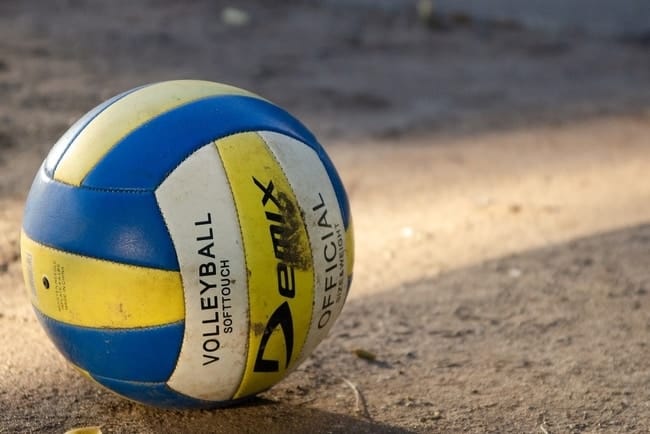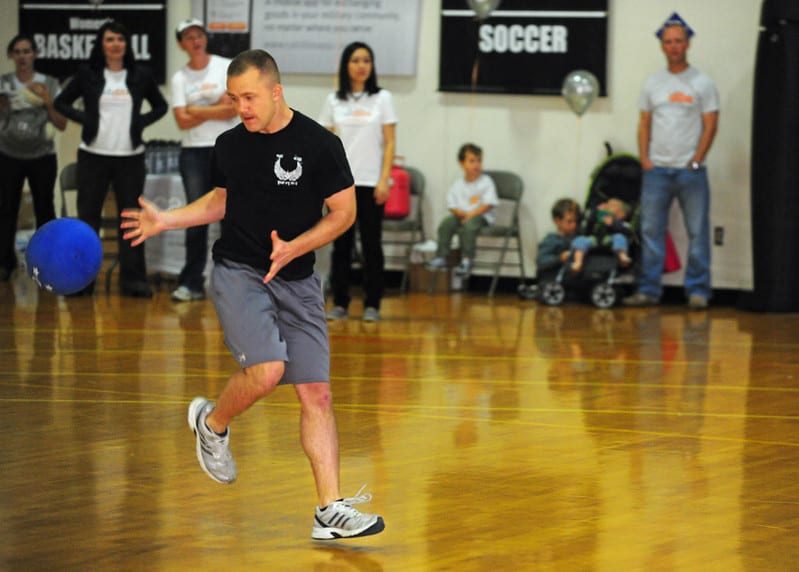Clara Baer created Nuke ‘Em, also known as Newcomb. For a while, it was second only to volleyball in terms of popularity among children.
Nuke ‘Em is a ball game with a net similar to volleyball. Participants in Nuke ‘Em catch and toss the ball over the net until a point is scored. The regulations of Nuke ‘Em are not standardized, but each team usually has at least six members.
You may think of Nuke ‘Em as an introductory game to volleyball. It debuted in the early 1900’s and has a lot in common with volleyball. Young children who may not be old enough to play volleyball yet can learn to love Nuke ‘Em and transition to volleyball when they’re ready.
There are many small variations, so this description of the game is for the most common rules, but I’ll include a few twists you can try in your next game as well.
How To Play Nuke ’Em?
Nuke ‘Em involves two teams of roughly 6 to 12 players on the floor at the same time. The serving team’s server starts the game by serving the ball over the net to the opposing team.
Just like in volleyball, the “serving position” is usually the back right corner of the court. The server may hit the ball serving volleyball-style, or they may throw it.
There are a lot of variations to the rules, but the main idea of Nuke ‘Em is that the ball must be caught rather than bumped, struck, or blocked. Just like in volleyball, your main goal is to not let the ball touch the ground on your side of the court.
Three players may catch the ball before being sent over the net. But each player can only interact with the ball for 2-3 seconds.
The ball is kept in play by being tossed across the net until a miss occurs.
If the receiving team fails to make a catch, the serving team gets the point, and the next play starts with the same server.

If the serving team misses, the serve is lost. The opposition team scores a point, and the following round starts with the opposing team serving.
When a team scores a point, the following play is served by the same server.
When a team wins the serve, the players on that team switch positions clockwise. They stay in the new formation until the serve is won again.
The game may be won by score, by a time limit, or by playing until one team loses all its players, depending on the rules decided beforehand.
If the game is to be ended by time, the rule is usually the team with the highest score after 30 minutes.
If playing to a particular score, the officials may specify the number themself, but 11, 13, and 21 are commonly seen.
Nuke ‘Em Elimination
If playing Nuke ‘Em elimination, the game takes on some characteristics that resemble dodgeball. Here are the most commonly accepted rules:
| Players are eliminated if: | Players may re-enter the game if: |
|---|---|
| They are the closest to a missed ball | A teammate catches the ball with 1 hand |
| They throw the ball out of bounds | A teammate throws an “ace” (untouched serve) |
| They throw a ball that is caught 1-handed |
Usually, players line up in the order they are eliminated and when a team wins the chance for a teammate to re-enter, the first player that was eliminated re-enters. One variation of the elimination rules is for the player who earns the re-entry of a teammate to be allowed to choose any of the eliminated players to re-enter.
The game ends when 1 team loses all of its players.
Additional Rules of Nuke ’Em
Because this game requires organization, several extra rules ensure the game runs smoothly:
- Serves must be taken from behind the line.
- With the ball, you can only take one step.
- Only the person in front of the net is permitted to throw the ball over the net.
- A ball that strikes the net and travels over is still playable.
- A player may not touch the ball more than twice in succession.
- Throughout the game, no player may touch the net or travel under the net to the other side.
Nuke ’Em Looks Like Volleyball, How Is It Different?
The most significant distinction between volleyball and Nuke ‘Em is that you must catch and throw the ball instead of serving, passing, or volleying in volleyball. In volleyball, on the other hand, catching is illegal, it requires only momentary contact.

Furthermore, Nuke ‘Em may be played with different amounts of participants. Still, there is usually a minimum requirement of 6 players on the court.
Volleyball teams must have exactly six people from each group on the court at the same time.
Another distinction is that Nuke ‘Em teams can have boys and girls. Volleyball, on the other hand, usually does not allow this in official matches in most leagues.
Moreover, the size of a Nuke ‘Em court can be varied, whereas a volleyball court is 29.6 x 59 ft. (9.02 x 17.98 m.).
Lastly, the top of the net in Nuke ‘Em is 6.56 ft. (2 m.), but a Volleyball net is 7.97 ft. (2.43 m.) tall.
Who Plays Nuke ’Em?
Anyone with ordinary fitness and ability can play Nuke ‘Em. However, because of its simplicity, it is better suited to young children. This makes it a great game for casual settings with a mixture of children and adults playing together.
Kids can play this sport on the playground or in an indoor gymnasium. The game teaches volleyball basics and promotes the development of hand-eye coordination and motor abilities.
Adults with limited physical abilities may also enjoy the game.
The game is being played in the United States, Canada, Australia, and likely many more countries around the world.
What Ages Usually Play Nuke ’Em?
Nuke ‘Em is a popular game among kindergarten students. It should be noted, however, that the game is suitable for all ages. In casual settings, Nuke ‘Em may be played by a wide variety of ages all in the same game!
It was created as a more basic game for children who are interested in volleyball.
Is Nuke ’Em Safe?
Nuke ‘Em is generally a safe game for children, but specific injuries are possible.
First, there is always a chance for head injuries since a ball is being passed through the air. The ball used in Nuke ‘Em is typically a very light volleyball, so the force of any impact is usually minimal.
If you are concerned, these injuries are easily avoidable with protective gear. Another option would be to use an even more forgiving ball, like a spongy dodgeball or a beach ball.

There Is a Chance for Finger Injuries
According to research, the fingers and palms are the most frequently damaged body parts in Nuke ‘Em. This is primarily due to a direct ball impact.
A Newcomb ball or a volleyball is used as the official ball. Notably, these balls are not tough, but they can occasionally deliver a nasty impact.
Because the goal of the sport is to hurl the ball as forcefully as possible into the opponent’s court, individuals receiving the ball are at a higher risk of hand injuries.
Even though finger injuries are deemed minor, they may have long-term consequences. According to one study, more than half of the wounded athletes had long-term finger pain.
The incidence of finger injuries in Nuke ‘Em is more likely than in volleyball due to the fact that players are trying to catch the ball, not just bump, volley, or hit it.
Ankles and knees were the second most frequently damaged areas of the body after fingers.
Injuries are becoming an increasing source of worry for both parents and players. However, understanding which areas of the body are most vulnerable allows you to take the following measures to avoid injury during gameplay:
- Before you start playing, stretch and warm-up.
- Make sure you have enough water to stay well-hydrated.
- Volleyball kneepads or elbow pads may be worn if players have a habit of hitting the floor.
- Stretch and warm up dynamically before a game, and be sure to cool down afterward fully.
- Allow your body to fully heal before returning to the court if you have been hurt.
Similar Sports To Nuke ’Em
Although Nuke ‘Em is growing more popular, there may not be a program in your area where you can participate in your age group.
In that case, besides volleyball, there are a few more sports that are extremely comparable to Nuke ‘Em:
- Catchball: a simplified form of volleyball in which players catch and throw the ball instead of hitting it.
- Throwball: a non-contact ball sport played on a rectangular court by two teams of nine players over a net.
- Hoover ball: a variation on volleyball named after US President Herbert Hoover in which a medicine ball is tossed over the net and collected before being thrown back.
- Fistball: an outdoor team activity similar to volleyball, but the ball is struck with your fist.
- Ecua-volley: Ecua-volley is a volleyball variation developed and played in Ecuador. A taller net and the usage of a soccer ball are two notable distinctions.
If you would like to learn about other variations of volleyball, make sure to check out our variations category page.
Final Thoughts
Nuke ‘Em is a simple, enjoyable game that you can find at sports centers all around the globe.
It is an excellent first option for young volleyball fans or those wanting to master the basics of the game.
You may use this footage to evaluate the game’s benefits and drawbacks to determine if it is appropriate for you or your children. If not, consider checking out one of the games that have a similar structure.
Sources
- FIVB: Basic Volleyball Rules
- Hohokus School District: Newcomb Study Guide
- JSTOR: A Lost Sport: Clara Gregory Baer and Newcomb Ball
- Let’s Get Together: NUKE ‘EM! – A GAME FOR THE WHOLE FAMILY!
- NCBI: Finger injuries in a developing sport: cachibol (Newcomb Ball)
- Ryde PSSA: NEWCOMBE BALL RULES AND CONDITIONS OF COMPETITION REVISED FEBRUARY 2019
- Scholastic: Activity Plan, Ages 5-6: Let’s Play Newcomb!
- Sport Aus: Newcombe ball
- Strength and Power For Volleyball: Basics of the Volleyball Spike Techniques, skills, and strategies
- Wikipedia: Newcomb ball
- Wikipedia: Volleyball variations
- Youth Group Games: Nuke ‘Em
Photo Credits
Feature image by gustavorodriguesteixeira from Pixabay
Children image by Ratna Fitry from Pixabay
Volleyball image by Alex Khaizeman from Pixabay
Dodgeball image by Presidio of Monterey on flickr.com: https://creativecommons.org/publicdomain/mark/1.0/
Recent Posts
Athletes, listen up! Do you have a closet full of old jerseys, sweatpants, and tees that you just can't seem to part with? Well, dust them off, because you're sitting on a goldmine of fashion...
You may have heard, or you may have noticed, that there's been a change to the rule about double contact in volleyball. In 2022, an experimental rule change began to be implemented, where the double...
